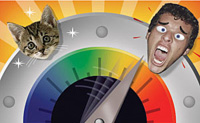sierraclub.org - sierra magazine - march/april 2012 - woe is us: hendra virus
Garbage in, Garbage out | Charismatic Microfauna: Tardigrade | Burning Plastic |
Shrinking Arctic Ice | Hendra Virus | Up to Speed
WOE IS US: Hendra Virus
 John Ueland
John Ueland
Take one flying fox, one horse, and one human. Mix well and add water. That seems to be the recipe for an often-fatal virus called Hendra, which some scientists fear has pandemic potential. "It's very scary," says Raina Plowright, a disease ecologist at Pennsylvania State University. "When it gets into a human, it goes full speed through every organ."
The flying foxes (a.k.a. fruit bats) that have long harbored Hendra aren't much affected by it. But in 1994, Hendra jumped the species line, infecting 20 horses in Queensland, Australia, which then infected their trainer and a stable hand. The trainer and 13 horses died.
Now the virus appears to be spreading. There were 18 outbreaks in Australia in 2011, 4 more than in the previous 17 years combined. Only horses were infected, but the potential for transmission to humans has Queensland veterinarians so spooked that a quarter of them refuse to treat horses at all. That's because Hendra has a 57 percent mortality rate.
And the virus has recently spread to dogs.
Hendra's surge may be linked to climate change, Plowright says. Her research found that Hendra levels in flying foxes spike when the animals are stressed by a shortage of food, as may have happened after cataclysmic floods soaked Brisbane last year.
At present, humans can catch Hendra only from horses, not from bats or other people. But that could change. Hendra is related to Nipah, a virus that jumped from fruit bats to pigs to people in Southeast Asia and killed 105 in Malaysia in 1998-99. Nipah can now be transmitted between humans, and Hendra could develop similar abilities.
"Every time there's an infection," Plowright says, "there's an opportunity for mutation." —Dashka Slater
Up to Speed